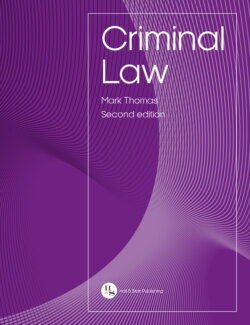Читать книгу Criminal Law - Mark Thomas - Страница 12
На сайте Литреса книга снята с продажи.
1.3Defining crime
ОглавлениеIt is worth noting immediately that there is no ‘universal’ definition of a crime. What constitutes a crime in one country may not constitute a crime in another. For example, in Iran, homosexual relations are illegal and punishable in some cases by death. In England and Wales, homosexual acts were illegal prior to the Sexual Offences Act 1967. In this respect, it is also relevant to note that whether particular conduct amounts to a criminal offence will vary and change as time progresses. By way of another example, prior to the Suicide Act 1961, the act of suicide was a criminal offence. Where an individual failed in such an attempt, they would be liable to a criminal conviction, with the penalty ranging between a fine and imprisonment. Historically, where an individual succeeded in taking their own life, their belongings would be surrendered to the Crown. By way of a final example at this stage, prior to the ground-breaking case of R v R (Rape: Marital Exemption) [1992] 1 AC 599, it was not considered unlawful for a man to rape his wife.
These examples, however, do not actually tell us how we can define ‘crime’. They merely provide examples of what amounts, or has amounted, to a criminal offence. For the most part, academics agree that the starting point in defining a crime is the attitude adopted by the state in relation to certain conduct. For instance, Farmer (‘Definitions of Crime’ in Cane and Conaghan (eds), The New Oxford Companion to Law (OUP, 2008)), contends:
It is now widely accepted that crime is a category created by law—that is, a law that most actions are criminal because there is a law that declares them to be so— so this must be the starting point for any definition.
In Board of Trade v Owen [1957] AC 602, Lord Tucker in the House of Lords concluded that a crime could be defined as
an unlawful act or default which is an offence against the public, and renders the person guilty of the act or default liable to legal punishment.
This definition, unfortunately, offers no assistance as to why certain conduct is considered ‘criminal’. According to Farmer, modern definitions of crime fall under two headings:
•the moral definition; and
•the procedural definition.
Farmer explains the moral definition as
based on the claim that there is (or should be) some intrinsic quality that is shared by all acts criminalized by the state. This quality was originally sought in the acts themselves—that all crimes were in an important sense moral wrongs, or mala in se—and that the law merely recognized this wrongful quality.
It can be explained then, by this definition, that certain conduct or actions are considered crimes in order to recognise public wrongs as violations of the rights and duties owed to the whole community. This view accords with that of Hart (‘The Aims of the Criminal Law’ (1958) 23 L & CP 401) who considered that a crime is ‘conduct which … will incur a formal and solemn pronouncement of the moral condemnation of the community’.
The procedural definition is favoured by other writers such as Williams (‘The Definition of Crime’ (1955) 8 CLP 107), who defined a crime as
An act capable of being followed by criminal proceedings having a criminal outcome, and a proceeding or its outcome is criminal if it has certain characteristics which mark it as criminal. … Criminal law is that branch of law which deals with conduct … by prosecution in the criminal courts.
Albeit a rather circular term (a crime is a crime if it is a crime), this definition accords with the modern practicalities of the criminal law as providing a rigid and detailed structure for the operation of charging and punishing the commission of criminal offences (see below at 1.7).
